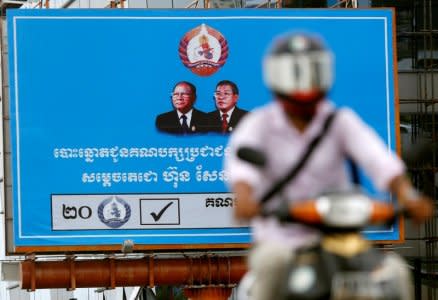U.S. says it is expanding visa bans over 'flawed' Cambodia poll

Thomson Reuters
WASHINGTON (Reuters) - The United States said on Wednesday it was expanding visa restrictions on individuals responsible for "anti-democratic" actions in the run-up to Cambodia's July 29 election.
The State Department said the move followed on from its Dec. 6 announcement that it would restrict entry to the United States of people involved in Cambodian government actions to undermine democracy, including the dissolution of the main opposition party and imprisonment of its leader Kem Sokha.
"The expanded entry restrictions may apply to individuals both within and outside the Cambodian government who are responsible for the most notable anti-democratic actions taken in the run-up to the flawed July 29 election," State Department spokeswoman Heather Nauert told a news briefing.
The U.S. announcement came as electoral authorities in Cambodia announced that the ruling Cambodian People's Party (CPP) won all 125 parliamentary seats in the election, a result the opposition called illegitimate.
Nauert said that in certain circumstances the restrictions would also apply to immediate relatives of those responsible for undermining democracy. But she declined to give names of anyone who might be affected by the expanded visa ban.
"We reiterate our call for the Cambodian government to take tangible actions to promote national reconciliation by allowing independent media and civil society organizations to fulfill their vital roles," she said.
Nauert repeated U.S. calls for the release of Kem Sokha and other political prisoners and for an end to a ban on the political opposition.
She described the election as "neither free nor fair."
(Reporting by David Brunnstrom; editing by Diane Craft)
See Also:

 Yahoo News
Yahoo News 
